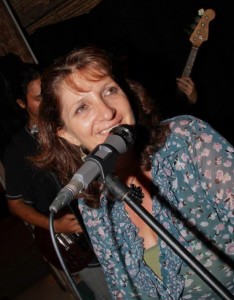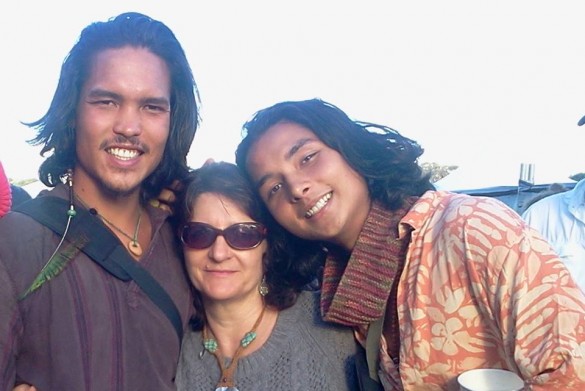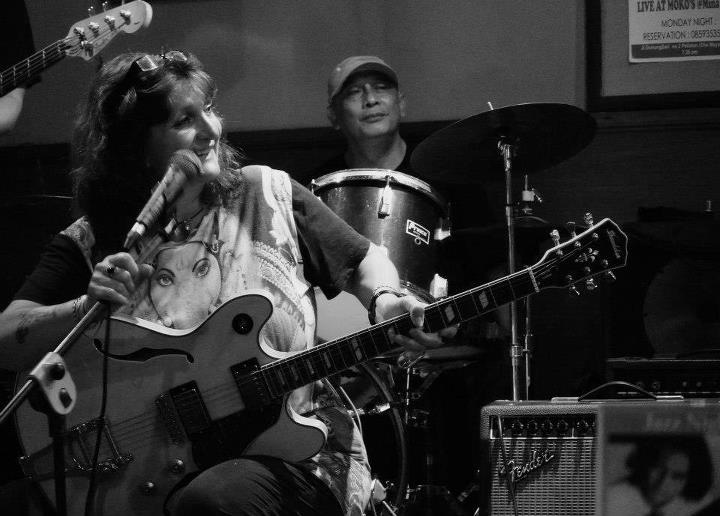
A prominent healthcare consultant, Bali’s famous nurse Kim Patra is the founder of Community Health Care. She is a registered nurse and midwife in Australia, while also staying active as a member of the Association of Indonesian Midwives. Patra is a certified hypnotherapist and often uses the technique as part of her birth relaxation programme on the island.
As a mother, advisor, nurse, columnist, blues singer, published writer and active part of the Bali expat community, Patra bridges different cultural values and offers a unique perspective on healthcare. Her book “In The Arms of The Angels” (2003) is based on her experiences as a medical professional and friend to victims of the infamous Bali Bombings at the turn of the millennium.
You are originally from Great Britain. At 13 your family moved to Australia. Tell me about your experience as an expat in Australia and how you came to live in Bali.
I wasn’t in Australia for much of my adult life. I married quite young at 17. My first husband was from Malang, Indonesia, so this piqued my interest in Indonesia. We have one daughter, and now two beautiful grandchildren. I went to nursing academy in Australia, studying general nursing and then specialized in midwifery from 1977 to 1982. By 1985, I was almost full-time in Bali. I was coming out of a bad marriage and was disenchanted with my personal life in Australia. Life in Bali was very different back then; it was very simple, facilities were basic, but between the windsurfing and the smiling people, I became hooked.
Did you always see yourself becoming a healthcare professional?
There are doctors, nurses and other health workers in my family. We weren’t a wealthy family so seriously studying medicine was out of the question. However, training and studying to be a registered nurse was a paid position. It was hard work with very long hours.
How did you become active in Balinese culture and a part of the Bali community?
My second husband was Balinese. We were married for eight years. We have two amazing sons; Made Ben and Nyoman Krisna. Having mixed Balinese sons, we respect the Balinese culture and continue to celebrate local traditions and ceremonies. I have been with my current partner, who is also Balinese, for over 20 years. Like myself, he is also a musician and has been a great role model to my boys.

You have lived here for over three decades. The Bali bombing was a defining moment in your life. Tell us about that experience and what inspired you to write ‘In the Arms of the Angels’, published in 2003.
The first Bali bomb is a definitive timeline marker for anyone who lived in Bali through this era – Balinese and non-Balinese. You often hear people refer to their lives on the island as “before or after the bomb”. It changed our lives. Bali went from a sleepy island paradise to being a potential target. It created suspicion and distrust between Muslim and non-Muslim communities. This situation was managed well by leaders of both communities and large-scale unrest was averted. In the aftermath of the first bomb, the Australian consulate called me at 5 am to go to Sanglah General Hospital. What awaited us was of nightmare proportions. Coincidentally, I had just completed a course in “Mass Trauma Initial Responder”, a huge benefit to me for the initial two days following the bomb. Writing the book was therapy for me. I needed to get the thoughts and images out of my head and onto paper. I did not have access to any therapy or counseling following the event and living on almost zero income at that time, private counseling was not an option. The book is a tribute to all the incredible people, from surgeons to coffee makers, that would otherwise be forgotten.
In what other ways did that tragedy and the aftermath change you?
I think it has made us all a bit more cautious wherever we are. I also value life, the time that I have, the family and friends that I have on a different level. A reporter pointed out that whenever I was in a public place (café or whatever), I would position myself where I could see who was coming and going. Something I was not consciously aware of. I was more affected personally by the second bomb as my 12-year-old son Kris was 50 metres from the Raja Café. He wisely went to the beach and walked back to Jalan Padma.
You are a midwife. How does being in touch with the creation of life on a regular basis impact you, and everyone else involved? Do you offer programmes in prenatal care?
I have been a midwife for over 30 years now. I came to Bali to get away from mainstream health care. I was able to put my skills to better use here in Bali than in Australia.
When I was pregnant with my son 28 years ago, prenatal care and postnatal care were almost non-existent here. That’s when I started a drive around [offering] pre and postnatal care service, mostly for expats who planned to give birth overseas.
Local doctors did not like me “interfering” with their patients at that time, so I could not involve myself with anyone birthing in Bali. All this changed when I attended a birth at Prima Medika hospital as a “friend”. The treating doctor overheard that I was a midwife and invited me to work in association with the hospital. Shortly after this, I became an affiliate midwife with the Association of Indonesian Midwives, and I was able to open my own practice, where, until this day, I see families for pre and postnatal care, as well as women’s and children’s health.
I don’t attend births anymore. I had been on-call 24 hours a day for 30 years for births and also for emergency medical evacuation flights. It’s time for family and grandchildren now. I still run a series of prenatal birth education classes. The classes are based on relaxation with hypnosis. All three of my grandchildren were born using hypnosis. The labours were pretty smooth, natural births with no intervention or drugs.
How are expats as patients as opposed to local Indonesians?
Interesting question. Expatriate patients that are living in Bali tend to be well educated so they have high expectations; they are inquisitive and expect a lot of information. Indonesian patients are used to being treated by Indonesian doctors, who generally give very little information and do not like to be questioned. These patients tend not ask about their health and accept advice readily, without question. Now we are seeing a change here. Local people are learning that they do have a right to question, and the younger doctors are becoming more responsive.
Being in the business of miracles (babies, birthing, etc), do you believe in mind over matter; that the power of prayer and meditation has great healing power? Have you witnessed miracles?
Absolutely. I believe the mind-body connection in achieving and maintaining good health is extremely effective. When our emotional health is affected in a negative way we will usually become sick. It is not possible to separate the mind from the body. I have been practicing meditation for many years. As a certified hypnotherapist, I am fascinated by the mind-body connection. I am also a realist. I believe the answer to health is to be open to both allopathic and alternative therapies. Miracles? Anyone who has taken part in birth believes in miracles.
You are involved in an HIV/AIDS programme for children here in Bali. How did that come about and how are you involved?
HIV is a huge problem here. HIV awareness is low amongst local people. I became acutely aware of this when a friend’s son became infected. She became actively involved in supporting the government hospital’s HIV Children’s programme, and her story was a bit of an eye opener for me. HIV/AIDS is here in Bali at every level of society. HIV rate among sex workers and “café” girls is as high as 30 percent.
HIV-positive women who give birth vaginally and breastfeed their babies will almost certainly pass the disease onto their babies. HIV in Indonesia is flourishing and ultimately it will be the babies and children who suffer. While HIV testing and antiretroviral drugs are free, formula milk, antibiotics and other maintenance therapies are not. So as to support these children and their families we created a Yayasan (foundation). I also try to incorporate awareness and fundraising.
Contact: [email protected]
Address: Community Health Care (CHC), Jalan Tunggak Bingin, Sanur




